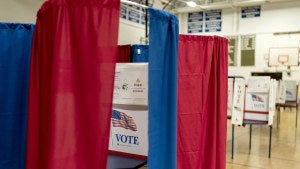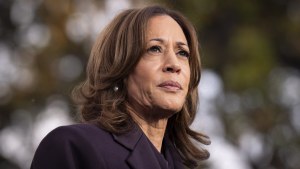US Elections Part of Global Trend Away from Incumbents

Public opinion polling offers insights into what cost incumbent leaders and parties at the polls.
Once the outcome of the 2024 US presidential elections was clear, the scrutiny over who or what to credit or blame for President-elect Trump’s dramatic comeback to the Oval Office began. Some questioned whether Vice President Kamala Harris had distanced herself enough from President Joe Biden’s policies; others blamed Biden for not stepping down sooner. Some criticized the Democrats’ messaging for being too progressive and out of touch with American voters, while others blamed the closed process of selecting the vice president as the Democratic nominee. Exit polls seemed to show that Hispanic males were voting for Trump in greater numbers than expected, as well as a hint that sexism could have played a role in the voting choices of male voters.
The truth is that these factors would be difficult to prove. Harris’ choice of strategy or vice president might have made a difference to a sliver of the population, the messaging perhaps turned off a segment of Democrats, or more might have voted for the Democratic nominee if Biden had stepped down sooner—but this would most likely only explain the margins among specific subgroups of voters. These factors alone are not enough to provide an overarching explanation. To understand what happened in the US vote, we need to look at global trends.
Usually Incumbency Is an Electoral Strength; Not in 2024
As some may have read, 2024 was the largest year of elections in global history. By some counts, nearly half of humanity inhabits one of the countries that held elections in the past 12 months.
Looking at the pattern among all votes cast over the year, what emerges is a wholesale atmosphere of hostility and blame against incumbent leaders and parties. John Burns-Murdoch from the Financial Times described the 2024 worldwide election results as the “graveyard for incumbent governments.” If voters didn’t kick out the incumbent party outright—like the Tories in the United Kingdom, Macron’s Ensemble coalition in France, and the Liberal Democrats in Japan—then they generally narrowed their vote share, like Modi’s BJP in India. (Mexico stands out as an exception here.)
Burns-Murdoch points readers to the figure below, showing that voters gave incumbents a thrashing in every single one of European Union (EU) and Organization for Economic Cooperation and Development (OECD) countries they tracked that held national elections in 2024. This is the first time this has ever happened since 1905.
We’re going to hear lots of stories about which people, policies and rhetoric are to blame for the Democrats’ defeat.
— John Burn-Murdoch (@jburnmurdoch) November 7, 2024
Some of those stories may even be true!
But an underrated factor is that 2024 was an absolutely horrendous year for incumbents around the world 👇 pic.twitter.com/7iuPQFs31o
The fact that different politicians, parties, messages, and policies all met the same destiny in 2024 suggests that there is a broader trend going on regardless of the charm, strength or ideological leanings of the sitting candidate or party.
What’s Behind This Anti-Incumbent Wave?
The COVID-19 pandemic has had a lingering effect beyond the health crisis. While publics seemed to give governments “grace” about an international virus that was beyond the control of any individual administration, voters did not consider the economic crisis caused by COVID-19 in quite the same way. Its inflationary toll was as infectious as the virus itself. From green onions in Indonesia, olive oil in Greece, and eggs in the United States to orange juice in the United Kingdom and vegetables in India, consumers around the world have been hit hard with increased prices for household goods. Besides the pandemic, these price hikes worsened due to supply chain disruptions from the wars in Ukraine and the Middle East. A 2024 Ipsos What Worries the World Tracker survey that included 29 countries found inflation was named as a top concern—if not the top concern—every consecutive month starting in 2022.
As costs went up, Biden’s approval rating went down. In 2020, several academics forecasted correctly that Biden would win by looking at state-level presidential approval ratings along with state-level economic measures. And in 2024, they accurately predicted that Biden would lose to Trump, state by state. The bottom line in their analysis: Biden’s approval readings never recovered from the damage caused by the spikes in inflation, even as inflation ebbed.
When people are worried about the cost of food at home, they often dislike their government sending money abroad, even to help allies. At least in the United States, many Americans—and particularly those who describe themselves as Republicans—think the government should be spending funds on domestic problems, not problems overseas. The 2024 Chicago Council Survey showed that Americans’ appetite for getting involved in global matters has diminished from the large majorities that supported international involvement about a decade ago, particularly among Republicans and Independents. In addition, support for continuing to assist Ukraine with arms and funding has also dropped. These shifts seem to be a consequence of preoccupation with domestic matters, especially those related to the economy and inflation; many seem to think the government must choose between international and domestic spending.
In addition to inflation, immigration increased in salience in the United States and other countries as another issue where voters did not see incumbent governments delivering on public expectations. Some concerns about immigration seem to be based on a misperception— or misinformation—that while average voters are really feeling the economic pinch, some undeserved immigrants are benefiting (even though there is no factual basis for this). Others may feel that immigrants are receiving more funding and attention than underserved communities in the United States.
Immigration wasn’t the only issue to spark misinformation. Though social media has some benefits, it also tends to amplify populist voices and conspiracy theories, and in doing so, wears down trust in institutions and global elites. As Henry Farrell argues, social media “creates publics with malformed collective understandings.” These collective misunderstandings also change the public’s relationships with experts and other elites. In the contemporary media atmosphere where no one group controls information flows and partisans of all stripes can easily find rationales that fit their beliefs, traditional elites are seen as out of touch with the beliefs and concerns of everyday people.
Conclusion
Mistakes that the Harris campaign may or may not have made could have resulted in some shifts around the margins, but these minimal shifts seem overshadowed by the larger global trends. In fact, Harris did pretty well given this backdrop. The final results will likely show that Trump won by only about a 1.5 point margin and with less than a full 50 percent of the vote. Trump and the GOP had a solid victory—but it was not a landslide. It will probably end up being the closest popular vote contest since 2000 once all votes are counted. Moreover, the House majority is also slim (220 Republicans vs. 215 Democrats), and while the GOP recaptured the Senate, the GOP candidates didn’t fare as well as Trump did (i.e. less of a down-ballot effect). These Republican already-narrow congressional majorities are exacerbated by the nomination of several GOP House members to administration positions, leaving Speaker Mike Johnson with little room for error in managing his fractious caucus.
This gives a broader perspective on the meaning of the 2024 elections in the United States. It was not a broad endorsement of the Republican Party or dismissal of Democratic ideology. It does not mean Trump and the Republicans have an “unprecedented and powerful mandate” as Trump proclaimed on election night. It does not mean the public supports radical changes like deporting millions of immigrants, withdrawing from NATO, or pulling US forces out of allied nations like South Korea. In this regard, public opinion can act as a constraint against mandate overreach, potentially even provoking a backlash.
That backlash could come quickly. Trump begins his second term underwater with the American public—per a new NPR/PBS News/Marist poll, 49 percent of Americans view the president-elect unfavorably, while 44 percent hold a favorable view. Moreover, while the public is very optimistic about their family financials changing for the better in the next year (44%, a record high in Marist polls since 2009), slightly more (48%) think tariffs of the type Trump has proposed will hurt the American economy.
It used to be that incumbents had an advantage in election dynamics. Not any longer. Incumbents now seem to be punished at the polls for not using their power to deliver on promises or expectations. Since 2000, the control of the US presidency, House, and Senate has flipped 16 times in 13 election cycles. Almost every election is a thus “change” election—and there’s little reason to think 2026 will be different.
The problem with this constant churn is that it tends to bring wide swings in policy, including foreign policy, that affects continuity in government and hurts US credibility among our allies. Unless publics around the world become more optimistic about their futures, newly inaugurated global leaders may find themselves facing down these same challenges during their next election cycle.




Related Content
 Public Opinion
Public Opinion
Results and analysis of the Council's annual survey of American views on foreign policy.
 Public Opinion
Public Opinion
The 2024 Chicago Council Survey finds there is often less division than imagined when it comes to long-standing pillars of US foreign policy.
 Public Opinion
Public Opinion
Republicans are focused on inflation and immigration ahead of the November election, while Democrats emphasize abortion policies and democracy.
